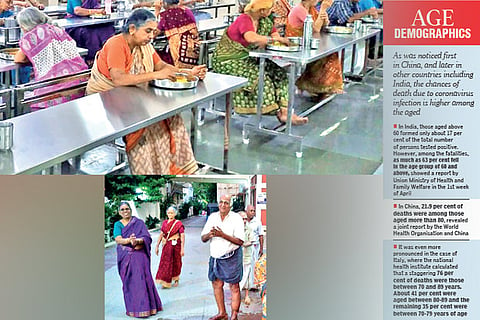

Chennai
Fearing for the safety of their inmates as coronavirus infection is claiming the lives of thousands of elderly persons world over, some of the old age homes in and around the city are sending back the inmates to their families or next of kin till the crisis is over. Though they form only about 17 per cent of the positive cases, the elderly accounts for as high as 63 per cent of deaths – a statistic that reveals the particularly high risk they face.
GS Senior Citizens Home in T Nagar has sent 15 inmates back to their families, as it faced difficulties in arranging proper supply of food after the shutdown came into effect. “We were unable to arrange medicines,” said Girija Subash, a caretaker at the home. The final nudge came from the officials of Greater Chennai Corporation, who had visited the home to enquire the situation. They suggested that the inmates be sent back to their relatives’ place for the interim.
It was similar at Gracious Homes in Anna Nagar that houses a little over 25 differently abled children. “At present, there are only two staff members and three inmates, including myself. We feared that our shelter would be more vulnerable during the pandemic. Hence, the inmates were sent back to their close to kin,” said Madhavan, one of the inmates who is still there.
The homes that have not yet sent back the inmates are taking extra precautions to ensure hygiene and safety.
Anandam, a free home for senior citizens situated at Red Hills, do not have the option of sending the inmates back to their homes, as the 105 elderly persons have neither any living children not any source of income.
There, visitors are not being allowed due to risk of infection. Even the milkman and vegetable vendor have been asked to keep them outside. “Comprehensive medical check-up is being done for those with diabetes and heart ailments,” said its managing trustee Bhageerathy Ramamurthy.
However, these inmates are not sitting idle. On Friday, they made 3,500 rotis, which was distributed to the needy through the nearby temple. “We even share our donations in the form of rice, vegetables with other old age homes nearby,” she said.
Similarly, at Charu Home for Aged at T Nagar that houses 35 inmates between the age of 64 and 96, visitors’ entry is restricted.
The even use a stick while collecting any form of donations, be it medicines or staples, said Dr Jannet Selvakani, the founder trustee. These are then kept isolated in an open warehouse for two days before being used, she added.
The inmates at Little Sisters of the Poor, Chetpet, all aged between 70 and 93, are given vitamin tablets. “Though it gets difficult to run the home without charity, masks and sanitisers have been given to them. Social distancing and isolation, too, are being followed at the home,” said Sister Grace.
Explaining the risk that the aged face, doctors said the infection becomes even more problematic due to age-related ailments.
“Those aged over 60, and with chronic ailments, are exposed to higher risks. When a group of elders are under one roof, the risk increases by 10 times,” said Dr Aloes Paul Vedandan, a medical practitioner.
“Our immune system weakens as we age, which makes us more vulnerable to infections. When the immune system gears up to fight, there is also a higher possibility of a syndrome called a cytokine storm (overproduction of immune cells and their activating compounds). Our body would overreact and produce too many of the chemicals to fight an infection. This could result in severe inflammatory reaction, which can cause significant damage in the body, including organ failure,” she added.
According to Dr K Kolandasamy, Director of Public Health and Preventive Medicine, the inmates at old age homes suffering from diabetes and hypertension should be given priority care and visitors should be restricted. “As senior citizens are most vulnerable, they have to practice social distancing and isolation thoroughly. Bed-ridden inmates should be secluded and be given special care at this time,” he said.
Visit news.dtnext.in to explore our interactive epaper!
Download the DT Next app for more exciting features!
Click here for iOS
Click here for Android